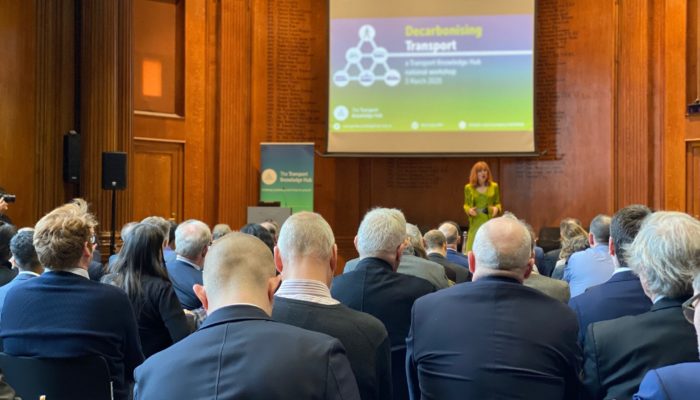
The Transport Knowledge Hub ran a very successful workshop in London on 3rd March on the subject of decarbonising transport. Over 100 people attended and took part in a lively debate stimulated by hearing the evidence and the challenges from expert panel members.
This seems a world away from where we are now. Working from home and avoiding all public gatherings, let along encouraging 100 people to travel from many parts of the country to sit alongside each other in a packed room to debate how we should travel less! We have much to learn from the current situation, which shows us that it is possible to carry on with much of our working lives and engage in productive communication without having to move from our homes.
It seems possible to many of us that our working lives will never be the same again as we are all forced to embrace new technology to conduct our every day lives and find that, for the most part, it works! In future we may be increasing our demands to Government to improve our broadband infrastructure and mobile telephone networks rather than asking for investment in road, or even rail.
At the workshop we heard from a wide range of experts in their fields.
- Dieter Helm, led the way by sharing a video address from his study, having given up travelling to conferences, especially abroad. He emphasised the urgency of the need for us all to change our behaviour regarding travel. He set out the facts very clearly – greenhouse gas emissions from road transport make up around one fifth of UK emissions. He highlighted the need to move to net zero carbon consumption.
- Stephen Glaister spoke about how economic incentives, such as road pricing could incentivise us to change our behaviour by responding to price signals. He stressed that a regime involving distance-based charging is essential to encourage us to change our attitudes towards car travel.
- Glenn Lyons, Professor of Future Mobility at the University of the West of England, spoke about the opportunities offered through technical innovation, such as driverless cars. He also spoke of the important role of transport planning in shaping changes in lifestyles and social practice.
- We heard from Gaynor Hartnell, an expert in renewable fuels, who outlined the alternatives to fossil fuels, such as bio ethanol, bio methane and hydrogen.
- Graham Vidler talked about the challenges faced by the bus and rail industry and the need to make it easier for more people to travel using sustainable modes, including better information, timetables that linked with other transport modes and more comfortable, reliable and cleaner vehicles.
- Richard Dilks, Chief Executive of CoMo UK spoke about the opportunities for reducing single occupancy vehicle journeys offered by car clubs and bike share schemes; and
- Ashok Sinha, Chief Executive of the London Cycling Campaign spoke passionately about the importance of cycling as part of the transformative mix of alternative modes of travel.
- Professor Jillian Anable, Chair of Transport and Energy at the influential Institute for Transport Studies at the University of Leeds, perhaps buoyed up by it being her birthday, set out many unforgettable challenges around the need for greater urgency and for protagonists of different solutions to work together and not stay in their respective ‘bubbles’.
There were many challenges to the ‘experts’ both from the panel and from the workshop participants. The overwhelming, if somewhat obvious, conclusion for me was that there is no single simple solution to this challenge, and that we need, as a society, to move quickly. Each possibility that was examined, such as more electric vehicles, autonomous vehicles, greater use of buses and trains, road pricing, demand responsive transport, alternative fuels all have their drawbacks. They do not, in themselves, provide the whole solution. A better integrated transport planning system would help.
Perhaps the biggest challenge is how to change our collective behaviour. Travel is a derived demand and as individuals we plan and undertake journeys for what we perceive to be good reasons. Each of us is implicitly assessing the cost (both financial and the time involved) and the benefit to ourselves of making a journey by whatever mode we choose. What we are not doing is taking account of the cost imposed on others through increased congestion, air pollution and carbon dioxide emissions. This is why economic measures such as road pricing can force us to ‘internalise’ these ‘externalities’ in our decision making. But such financial penalties do have a social impact by enabling those with higher incomes to be able to travel more freely by road at times of their choosing.
My reflection on the day was that there is no single solution. We need a balance of policy changes and pricing initiatives that encourage people to make the right choices. Greater collaboration between local and national Government and between different modes would help and innovative technology will solve some of the currently intractable problems around extending battery life and producing alternative fuels cheaply and efficiently. However, this will be a slow process and what we really need is a social tipping point, such as occurred when people accepted the smoking ban in public places and that not wearing a seat belt was socially unacceptable not just illegal.
Well, perhaps Coronavirus has given us that shock to society that will change our behaviour and have a long-lasting impact on our travel choices. Decarbonising transport may flow naturally as we reduce the number of journeys, both for work and for leisure and make better use of the technology available to communicate. Perhaps we might also stop to reflect more and spend meaningful time with our loved ones. The latter, certainly, will be good for the planet.
Let us hope that some good will come of the present crisis!
About the Author
This post was written by Hilary Chipping. Hilary Chipping is the CHief Executive of South East Midlands LEP.
